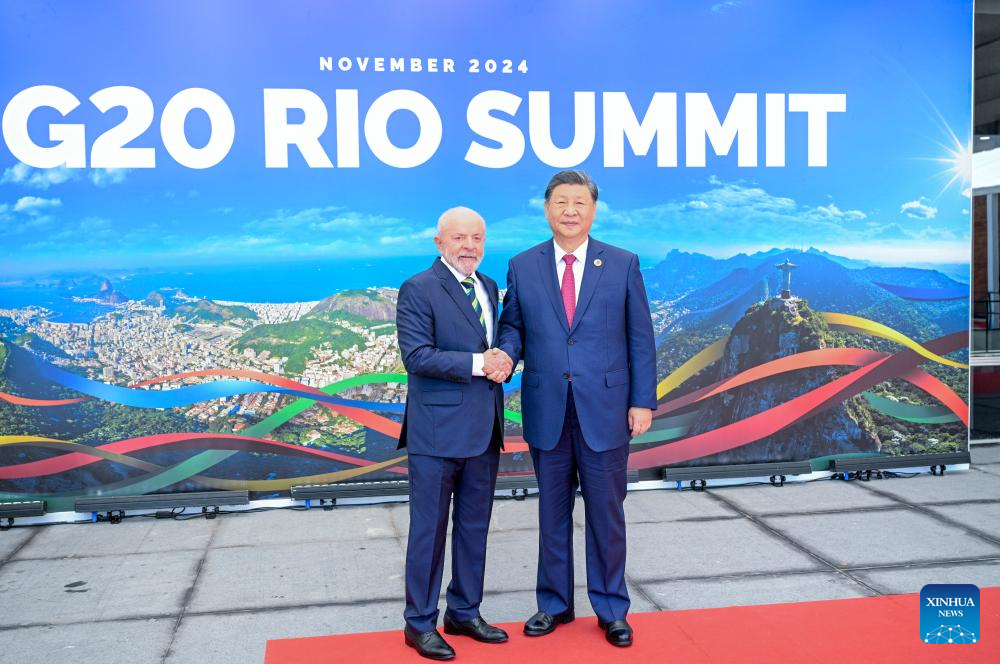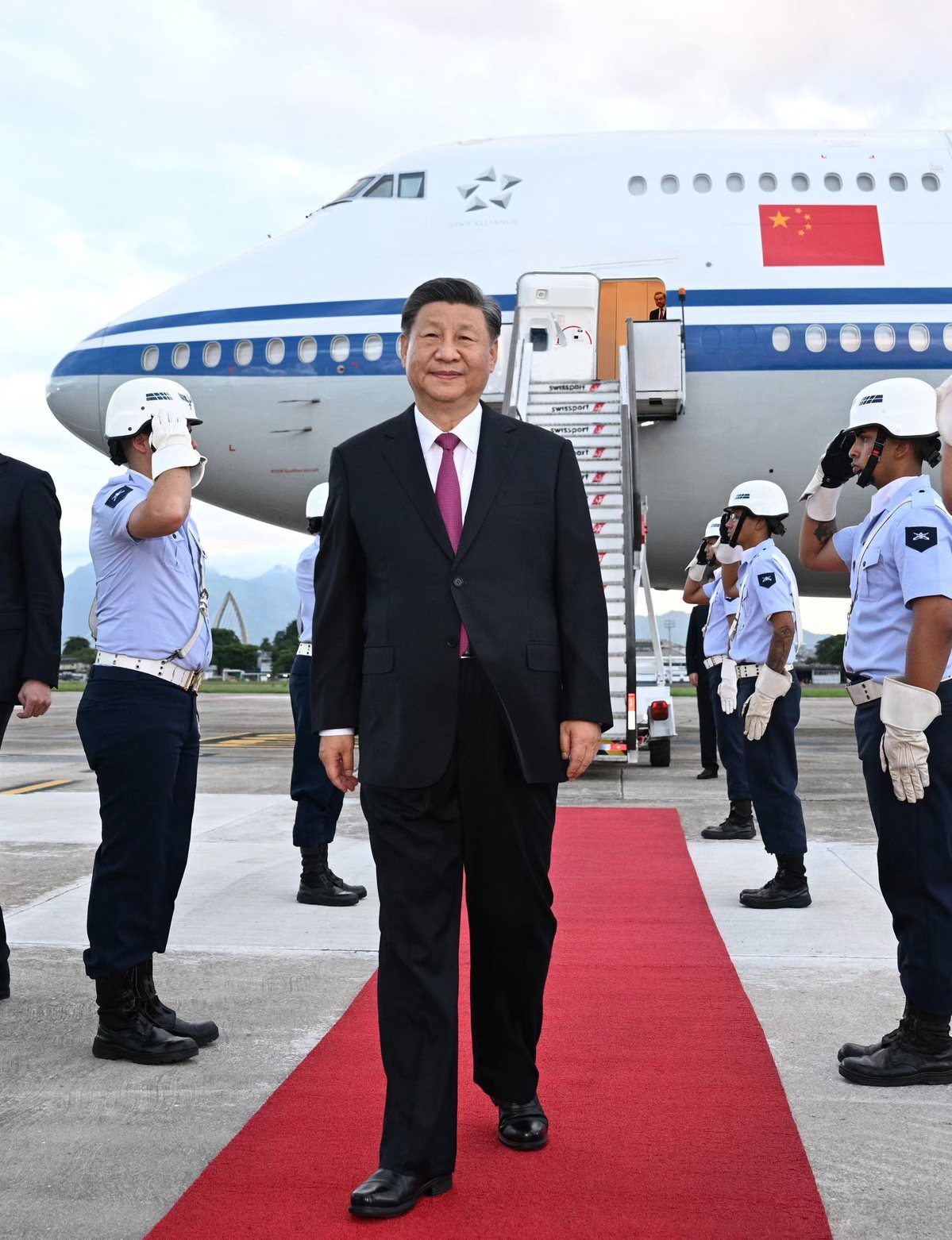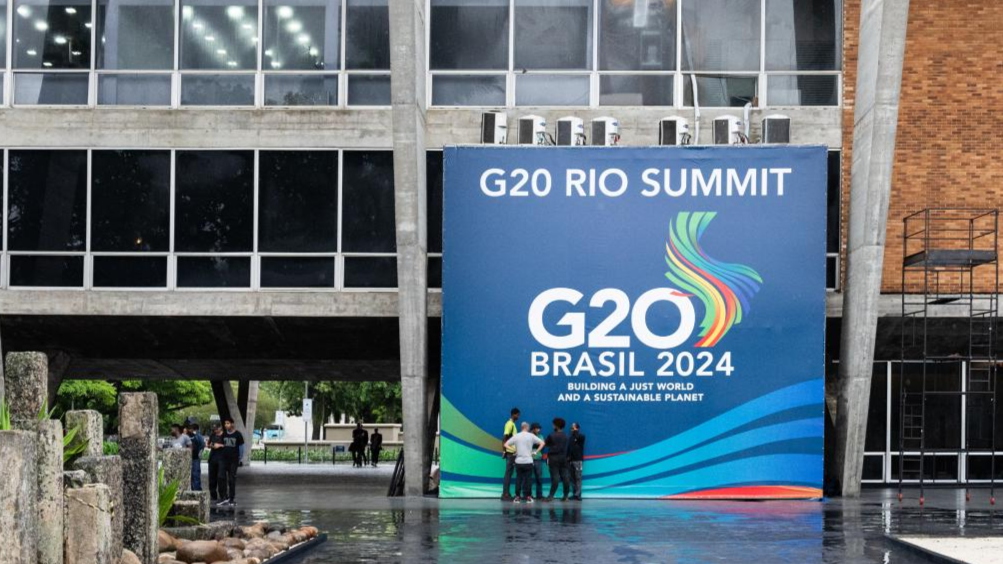
President Xi Jinping arrived in Rio de Janeiro on Sunday, kicking off a five-day trip to Brazil that is expected to usher in the next "golden 50 years" for China-Brazil relations.
Xi, after wrapping up a trip to Peru, is set to attend the 19th G20 Summit in Rio de Janeiro and make a state visit to the South American nation.
In a written statement delivered upon his arrival at the airport, Xi said the China-Brazil relationship is now at a crucial historical juncture, as the two nations have celebrated the 50th anniversary of the establishment of diplomatic relations this year.
"I made four visits to Brazil and witnessed the development and changes in the nation over the past 30 years," he said in the statement, adding that stepping onto this hospitable land again makes him "feel particularly warm".
China and Brazil are like-minded good friends and good partners moving forward hand in hand, Xi said. The two nations, though separated by vast oceans, are attracted to each other and echo each other at a distance, he added.
Xi said he looks forward to engaging in an in-depth exchange of views with Brazilian President Luiz Inacio Lula da Silva on further strengthening bilateral ties and synergizing the two countries' development strategies, and on international and regional issues of mutual interest and concern.

Lula said in a recent interview with China Central Television that Brazil and China share many common ideas, and both Xi and himself are committed to building a more just world.
By establishing a deep strategic partnership, Brazil and China can contribute to the development of both sides while also advancing global progress, Lula said.
In the statement, Xi also expressed readiness to work with all parties attending the G20 Summit for an equal and orderly multipolar world and universally beneficial and inclusive economic globalization. He said he hopes the G20 will play a greater role as an important platform for international economic cooperation.
ALSO READ: Xi emphasizes pursuit of common development
An Uber driver in Rio de Janeiro, who gave his name as Marcos, said there has been a lot of news in the country about Xi's state visit.
"I know that the president of China is very close to our president," he said, adding that it's good to have partners like China that are influential in terms of economy and other areas.
Analysts have said that China-Brazil relations are currently at their best in history, and the two nations' cooperation has gone beyond the bilateral scope, setting a model for South-South cooperation.
The China-Brazil comprehensive strategic partnership has experienced steady growth over the past years. China has been Brazil's largest trading partner for 15 consecutive years and is a major source of foreign investment in Brazil.
Zhou Zhiwei, a senior research fellow at the Chinese Academy of Social Sciences' Institute of Latin American Studies, said the two countries enjoy a high level of political mutual trust and a high degree of consistency in policy philosophies and approaches.

Many developing countries face shortages of capacity, funding and technology in addressing sustainable development issues, he said, adding that China and Brazil could take joint actions to address such challenges while promoting reforms in global governance to achieve a fair and equitable system.
Despite their different national conditions and unique experiences in eliminating hunger and poverty, both China and Brazil have similar people-centered policies and approaches that emphasize fairness and inclusiveness, and they can learn from each other and jointly address the challenges faced by Global South members, Zhou said.
Zhu Jiejin, a professor at Fudan University's School of International Relations and Public Affairs, said the 50-year partnership between the two largest developing countries in the Northern and Southern hemispheres aligns with the agendas of multilateral frameworks.
"The G20 offers a more equitable and balanced platform for developing countries to participate in global governance," Zhu said. "The participation and collaboration of China and Brazil in the G20 represent the interests of the Global South."
READ MORE: Visit set to fuel growth, solidify ties
The G20 presidencies have been held by developing countries in recent years, with Indonesia in 2022, India in 2023, Brazil this year and South Africa next year.
Zhu said that these presidencies held by developing countries, particularly three BRICS countries, help advance the development agenda of the Global South within the G20 framework.
Li Shangyi contributed to this story.
Contact the writers at zhoujin@chinadaily.com.cn


